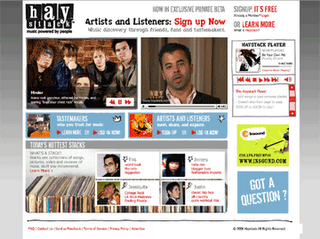Neither do the folks at PCWorld:
The service, due later this year, will be offered by a company called SpiralFrog, which says it would like to sign deals with the other major music labels. Watch a 90-second ad and you can download a song; watch a two-minute one, and you can download a video; to keep them, you'll need to return to SpiralFrog's site and watch more ads. The music will be free, but not freely available, and because the music and copy protection are wrapped up in Microsoft's WMA format, the tunes won't play on the vast majority of audio players out there (read: iPods).
What kid is going to waste any time watching ads to get a song. It's WORK. Advertising works best when it's not a roadblock to the content you want. At a baseball game, do you have to watch a commercial on the big screen before every pitch? No. The ads are in the background and don't impede the experience.
Clearly those involved at this company are executives who are far removed from the reality of the current music marketplace. It's musical lipstick on an advertising pig. (apologies to pigs everywhere)
